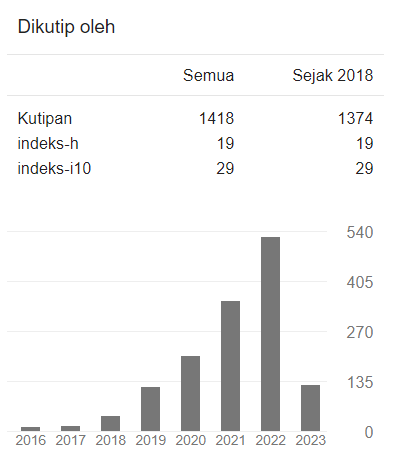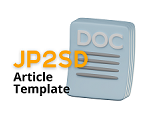PENGEMBANGAN PENGENALAN AIR DENGAN TEKNIK GAYA BEBAS UNTUK SEKOLAH DASAR
DOI:
https://doi.org/10.22219/jp2sd.v6i2.7236Keywords:
Pengembangan, pengenalan air, sekolah dasarAbstract
keterampilan gerak dalam proses pembelajaran pendidikan jasmani di sekolah
dasar salah satunya adalah gerak dasar renang. Alasan mengapa cabang renang dapat
digunakan untuk mencapai tujuan pendidikan jasmani adalah karena renang memilki
banyak manfaat. Penelitian ini bertujuan mengembangkan pengenalan air dengan teknik
gaya bebas untuk sekolah. Hasil eval uasi uji coba kelo mpok kecil 78,00% unt uk ahli media,
82,08% unt uk a hli Pembelajaran Penjas, 77,79% untuk ahli Renang dan 90,90% untuk ahli
pembelajaran penjas. pada uji kelo mpok besar dengan menggunakan 30 siswa dipero leh
persentase 90,15%, berdasarkan hasil tersebut model pengembangan pengenalan air
dengan teknik gaya bebas untuk sekolah dapat di gunakan dalam proses pembelajaran
Downloads
Downloads
Published
Issue
Section
License
Authors who publish with Jurnal Pemikiran dan Pengembangan Sekolah Dasar (JP2SD) agree to the following terms:
- For all articles published in Jurnal Pemikiran dan Pengembangan Sekolah Dasar (JP2SD), copyright is retained by the authors. Authors give permission to the publisher to announce the work with conditions. When the manuscript is accepted for publication, the authors agree to automatic transfer of the publishing right to the publisher.
- Authors retain copyright and grant the journal right of first publication with the work simultaneously licensed under a Creative Commons Attribution-ShareAlike 4.0 International License that allows others to share the work with an acknowledgment of the work's authorship and initial publication in this journal.
- Authors are able to enter into separate, additional contractual arrangements for the non-exclusive distribution of the journal's published version of the work (e.g., post it to an institutional repository or publish it in a book), with an acknowledgment of its initial publication in this journal.
- Authors are permitted and encouraged to post their work online (e.g., in institutional repositories or on their website) prior to and during the submission process, as it can lead to productive exchanges, as well as earlier and greater citation of published work (See The Effect of Open Access).

This work is licensed under a Creative Commons Attribution-ShareAlike 4.0 International License.



















